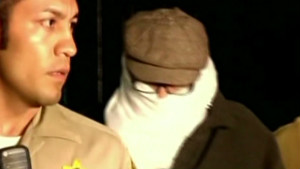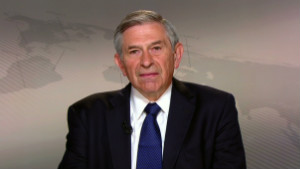 Protests sparked by an online film that mocks Islam's holy prophet
entered a second week Monday, raising questions about whether the furor
is isolated or a sign of broader anti-American sentiment in the Muslim
world.
Protests sparked by an online film that mocks Islam's holy prophet
entered a second week Monday, raising questions about whether the furor
is isolated or a sign of broader anti-American sentiment in the Muslim
world.
On Monday, demonstrators
took to the streets in Afghanistan, Indonesia, Pakistan and Lebanon.
Answering a call from the leader of Hezbollah -- deemed a terrorist
organization by the United States -- thousands packed the streets of
Beirut's southern suburbs and chanted "Death to America!"
The largely peaceful
crowd waved the yellow flag of Hezbollah and carried posters that read,
"No to the insulting of the prophet."
"Prophet Mohammed is our commander," they chanted. "Down with Zionism."
Hezbollah leader Hassan
Nasrallah
called for fresh protests Monday over the video, which he
described as "a dangerous turn in the war against Islam and the great
prophet."
In a rare public
appearance, Nasrallah appeared before the protesters on Monday and
called on all Muslims to push for the passage of laws in countries
around the world to criminalize "insulting monotheistic faiths and their
great prophets, from Abraham to Moses to Jesus and Mohammed."
"The world until now cannot comprehend ... the degree of insult this disgusting film caused to the Prophet Mohammed," he added.Earlier
in the day in Afghanistan, hundreds of demonstrators attacked police
officers along a road leading to the U.S. Embassy in Kabul. In
neighboring Pakistan, at least one person was killed Monday when
protesters clashed with police in an anti-American demonstration in the
tribal region along the Afghan border.
And in Indonesia,
protesters threw rocks and used slingshots to launch marbles at riot
police outside the U.S. Embassy in Jakarta. Police responded with tear
gas.
The United States has
made it clear that it did not sanction the low-budget, amateurish
14-minute movie trailer posted on YouTube and produced privately in the
United States. The clip, which has been banned by YouTube in several
countries, mocks the Prophet Mohammed as a womanizer, child molester and
killer
The film clip was
relatively obscure until last Tuesday, when protesters upset about it
attacked the U.S. Consulate in Benghazi, Libya, killing Ambassador Chris
Stevens and three other Americans. The same day, rioters breached the
U.S. Embassy in Cairo, although there were no casualties.
Islam forbids any depictions of Mohammed, and blasphemy is taboo among many in the Muslim world.
Since last Tuesday,
protests have spread to more than 20 nations, and the United States has
increased security at its embassies and consulates worldwide
.
Rice: Protests have 'nothing to do with' U.S.
The demonstrations are
part of the turbulence that is inevitable in a region that has undergone
tremendous change over the past year, according to the U.S. Ambassador
to the United Nations Susan Rice.
"It's a change that the
United States has backed because we understand that when democracy takes
root, when human rights and people's freedom of expression can be
manifested, it may lead to turbulence in the short term, but over the
long term, that is in the interest of the United States," she told CNN
on Sunday.
Rice appeared on
numerous Sunday talk shows to put context around the demonstrations that
dominated the news last week and raised concerns about the wider
implications, particularly in countries like Egypt that have strong ties
to the United States.
She said the mobs
protesting outside U.S. embassies are a minority and "have largely lost
in these emerging democratic processes."
"And just as the people
of these countries are not going to allow their lives to be hijacked by a
dictator, they're not going to allow an extremist mob to hijack their
future and their freedom," she said.
Rice also insisted that the protests are nothing more than outrage over the online video.
"We are of the view that
this is not an expression of hostility in the broadest sense toward the
United States or U.S. policy," Rice told Fox News. "It's proximately a
reaction to this video and it's a hateful video that had nothing to do
with the United States and which we find disgusting and reprehensible.
But that is not the view
of an independent American Islamic organization, whose executive
director said the issue has gone beyond sensitivity over the video.
"The film was just an excuse to lead to these kind of riots in the street," Zainab Al-Suwaij of the American Islamic Congress told CNN from Washington.
She urged U.S.
government officials to pressure officials in countries where
demonstrations have taken place to control their people.
"The only language that they do understand over there is the pressure that comes from the government," she said
Investigation into ambassador's killing
Libya has taken steps to
find and arrest those responsible for last week's deadly consulate
attack, bringing in dozens for questioning over the weekend, Libyan
officials said. The exact number of arrests was unclear. One Libyan
official said those arrested included suspects from Mali and Algeria, as
well as some al Qaeda sympathizers.
There is still confusion
about whether investigators believe the attack on the U.S. Consulate in
Benghazi was planned or spontaneous.
Mohamed al-Magariaf, the
head of Libya's General National Congress said there was "no doubt" the
attack was premeditated, telling CBS on Sunday that it "was planned by
foreigners, by people who entered the country a few months ago, and they
were planning this criminal act since their arrival."
But an unnamed senior
Libyan government official said there has been no evidence to indicate
the attack was planned, or that al Qaeda was involved. And he disputed
al-Magariaf's estimate that 50 people were arrested over the weekend,
saying it was much lower.
U.S. diplomat Susan Rice
also said there is no evidence "at present that leads us to conclude
this (attack in Benghazi) was premeditated or preplanned."
If it was planned, that
could indicate a more potent anti-U.S. hostility in Libya, despite
Rice's assertion that the United States is "quite popular in Libya, as
you might expect, having been a major partner in their revolution."
The FBI is also
investigating the Libya attack but has yet to enter the country because
of volatility there. In the meantime, FBI agents are interviewing
witnesses outside Libya, federal law enforcement officials said.
While U.S. Secretary of
Defense Leon Panetta told reporters over the weekend that the worst of
the violence appeared to be over, the United States was tightening
security measures anyway.
Nonessential personnel
were ordered to leave the American diplomatic missions in Sudan, Tunisia
and Libya. In Yemen, consular services have been suspended until the
end of the month. And on Monday, the U.S. State Department -- citing
"current safety and security concerns" -- urged U.S. citizens to avoid
all travel to Lebanon.
But the U.S. Embassy in
Cairo, the scene of five consecutive days of protests, returned to full
staffing Sunday, the U.S. State Department said.
Filmmaker in hiding, video blocked
Federal officials say
the man behind the privately produced film that sparked worldwide
protests is Nakoula Basseley Nakoula, a convicted felon with a history
of using aliases to hide his actions. Nakoula, who lives in Los Angeles
County, California, is on probation for bank fraud.
Nakoula and his family
have left their Cerritos, California, home for an unidentified location,
the Los Angeles Sheriff's department said Monday.
Reports that Nakoula,
who initially told The Wall Street Journal he was an Israeli, is a
Coptic Christian have raised concern about a possible backlash against
the minority religious group in Egypt, where tensions between Copts and
Muslims have risen in recent years. Muslim and Coptic leaders held a
joint news conference Monday in Los Angeles in which they condemned the
violence.
Despite the firm
condemnation by U.S. government officials, some in the Muslim world --
especially those raised in regimes in which the government must
authorize any film production -- cannot accept that a movie like
"Innocence of Muslims" can be produced without being sanctioned by
Washington, said Council of Foreign Relations scholar Ed Husain.
"They're projecting ...
their experience, their understanding (that) somehow the U.S. government
is responsible for the actions of a right-wing fellow," said Husain, a
senior fellow at the New York think thank.
A day after the protests broke out, YouTube announced it was restricting access to the video
and since then, Google India has blocked access to the video.
Afghanistan and Pakistan have also ordered an indefinite block of
YouTube to prevent people there from watching the clip.
But if the ongoing protests are about more than just a low-budget film clip, these moves may do little to curb the violence.
"It's a bigger picture
than the film only," warned Zainab Al-Suwaij of the American Islamic
Congress. I think there are a lot of other political goals behind the
riots going on (and) the film was just an excuse to lead these kind of
riots in the streets.
"The political goals that these radical groups have ... are much bigger than just bad quality film that's been put on YouTube."
CNN
EDITED.LII
CNN
EDITED.LII


No comments:
Post a Comment